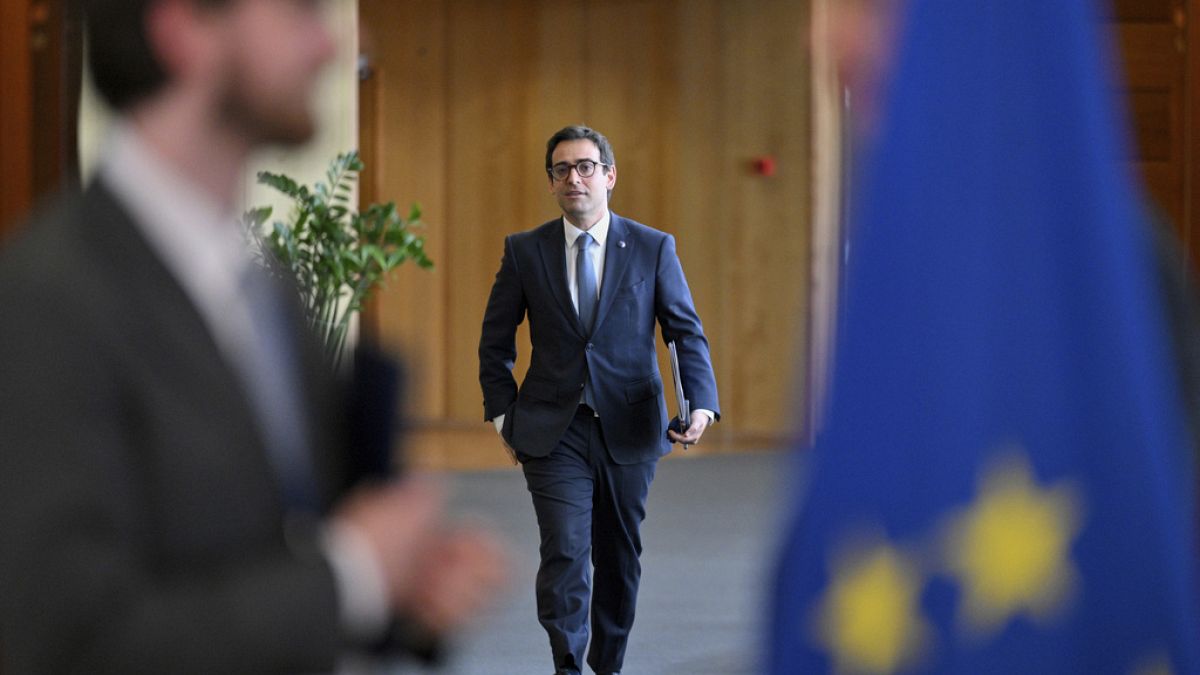Efforts to promote digitisation of the single market underpin a new strategy to breathe life into the project set to be presented by EU Commissioner Stéphane Séjourné on Wednesday, according to a draft seen by Euronews.
The plan sets out six pillars for improvement of the single market and refers to the context of a global trade crisis.
The Commission wants to remove ten “terrible” market barriers that currently “negatively impact trade and investment”, boost European services markets that bring the highest economic value, relieve the burden on SMEs, digitize administration, and push member states to address administrative barriers on national level.
A separate Single Market Omnibus proposal set to be published on Wednesday alongside the strategy will be designed to cut red tape for SMEs and mid-cap firms, promising to shift the sector “from a document to a data-based single market”.
Fragmented IT systems, and a lack of data exchanges make it difficult for businesses to comply with regulatory requirements, the Commission text claims, stressing the need to move from “exchanging paper documents towards exchanging digital data.”
It proposes making a so-called Digital Product Passport (DPP) compulsory and allowing companies to disclose and share product information – including conformity documentation, manuals, safety and technical information – across all new and revised product legislation.
The first DPP, for batteries, is expected to become operational in 2027 under the plan and the tool will be rolled out to other product categories. This will “result in swift cost reduction for both economic operators and authorities,” the text says.
Further digitisation efforts include promoting digital invoicing, which currently has a low uptake across the bloc. The Commission will table a proposal late next year for it to become the mandatory standard for public procurement.
The strategy also envisages modernising the current framework of product rules determining what may be placed on the market, which it says need “improvement”, through planned reforms slated for the second quarter of next year.
A spokesperson for European consumer group BEUC told Euronews that current rules don’t adequately address “the many challenges brought by e-commerce”, resulting in unsafe products entering the EU market via online marketplaces.
High-level political meeting to target services
The strategy will target promotion of services across the single market and the document stresses regulations in member states which it claims currently restrict access to around 5,700 services activities.
It proposes addressing this by harmonising authorisation and certification schemes for providers of services across the single market, and through new rules to make it easier for highly skilled workers to temporarily provide services cross-border. The European social security pass will also be deployed and enable the digital verification of social security rights.
In addition, a legislative proposal will target territorial supply constraints imposed by large manufacturers which hinder retailers buying products in one member state from reselling in another.
The strategy proposes that member states’ governments appoint so-called “Sherpas for the Single Market” to operate within in their prime minister’s or president’s office, to take charge of promoting the application of the rulebook.
To strengthen an existing Single Market Enforcement Taskforce – a group which brings member states’ authorities together with and the Commission – the EU executive proposes staging an annual high-level political meeting of EU ministers, the national “sherpas” of the single market, as well as Séjourné to provide strategic and political guidance to the taskforce. A first high-level political meeting should take place at the end of the year.
The omnibus package presented Wednesday should also improve standardisation which remains too slow according to the EU executive by allowing the Commission to establish common specifications. The aim is also to strengthen the EU’s role as a global standard-setter. A review of the standards regulation will also be announced.
EU lawmaker Sophia Kircher (Austria/EPP) told Euronews that services and capital market sectors are currently suffering from the lack of harmonisation. “National differences in regulations slow down our SMEs in particular when they want to operate across borders,” Kircher said.

